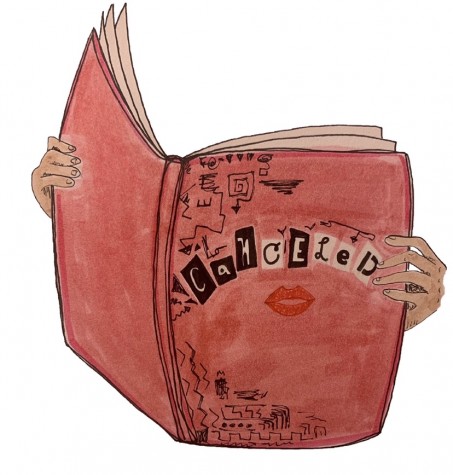“Cancel Culture” and the marketplace of identity
April 29, 2021
Cancel culture is a tiresome topic. The media has beaten it to death, and so much of the discussion comes from right-wing pundits who want to play the victim. Usually, cancel culture is an extension of celebrity culture, whereby the fears, hopes, desires and hatreds of the people can be vented onto a digital cast of characters with whom we have no real relationship.

The way that these characters’ lives (and ours) are framed through cyberspace makes life itself seem like a movie with clear cut villains and heroes. At the keyboard or touchscreen, we are like Roman emperors in mob-form, turning our thumbs down for the gladiator to be killed, and indulging our most merciless and antisocial impulses.
The way we now live our lives — simultaneously as an audience member and performer in a constantly unfolding digital spectacle — has resulted in a sort of cultural schizophrenia. One half of the country supposedly hates the other, and we are constantly trying to prove to ourselves and our communities that we are “on the right side.” Meanwhile, we fear the social death that awaits us if we dare speak up to question the rules of our group.
On a grander scale, we know that those who hold power in both political parties lie, and we accept it. We know that we as individuals are politically disempowered. We know that our vote is mostly meaningless, and we know that there are fewer and more limited opportunities to get involved in politics outside of the electoral system.
That being the case, we turn politics into a video game. We project a digitized world of spectacle onto our personal lives, where people become either allies or enemies and where we falsely gratify our conscience by ganging up on, defaming and exiling those who don’t conform.
This form of politics, if you can call it that, is actually the natural extension of a culture that turns everything (including attention and identity) into a product to be bought and sold, a culture in which everything we do becomes a branding exercise. In this culture, “identity politics” is profitable for those who sell products, ideas and political candidates — even the worst elite political and economic powers co-opt the imagery and fiery rhetoric of progressive movements, reducing them to mere brand accessories.
It’s also precisely this framing of politics as a consumerist spectacle that makes identity politics anti-political, because it isolates people into target demographics in the same way that corporations do when they sell their products, then panders to audiences, cultivating their sense of identity to sell them something. This market-framing of culture — known broadly as “neoliberalism” — forecloses the shared sense of possibility that arises spontaneously between people outside of a market context.
Identity politics seek to capture that sense of possibility and privatize it by turning society into a vast, fragmented marketplace where those in power can manipulate and mold peoples’ desires at will through the fake world of cyberspace. It’s correct to call identity politics anti-political because politics — specifically in democracy — in its truest form is not about any one individual or group of people but about that very shared sense of possibility that exists between neighbors.
None of this is to say that we shouldn’t emphasize allyship to pursue racial, political, economic and social justice. But beyond this limited form of social cohesion, we need to embrace a further shared sense of possibility. Strictly adhering to any kind of identity politics — conservative, liberal or other — will always place a limit on that sense of possibility, which will always erode the faith people need to have in each other in order for society to function.
With the dominance of “cancel culture” and the identity politics from which it springs, it is easy to forget that the most radical, defiant and important sense of shared possibility that can arise between people — beyond political allyship — is friendship.
With friendship, we forget what we are and start to discover who we can be. Our individual identities fade as we share with one another the gift of a laugh, a smile, a hug or a kiss. The most important fact here is that these things are actually gifts, and gifts are not to be bought, sold, branded or advertised. It is this shared sense of possibility in the gift of friendship that defines what it means to be human, and it is the only gift of friendship that can help us transcend the spite of these absurd culture wars.





